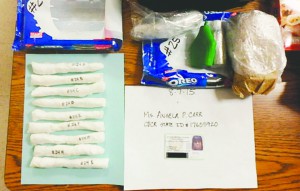A supervisory drug counselor at Calipatria State Prison in Imperial County would bring methamphetamines, heroin, and marijuana into the prison concealed in bags of chips, Oreo cookie containers, oatmeal boxes, and coffee cans, said the U.S. Attorney’s Office in San Diego.
A grand jury indicted the counselor along with seven other people, including inmates attending the prison’s drug counseling program, on charges that they were members of a network that smuggled drugs and illegal cell phones with a prison value of nearly $1.2 million.
“This kind of prison security breach is a serious problem. Inmates with cell phones specifically can continue committing crimes, operating criminal enterprises, like in this case running drugs from inside the prison,” said U.S. Attorney Laura Duffy at a press conference.
This is also the first time that the San Diego Federal Bureau of Investigations (FBI) and California Department of Corrections and Rehabilitation (CDCR) officials have targeted not only the corrupt prison official, but inmates and their conspirators on the outside.
According to court documents, 44-year-old supervisory drug counselor Angela Carr received the drugs from three women who have relationships with inmates.
Carr would meet the women in parking lots, and would then smuggle the drugs – such as methamphetamines, heroin, marijuana, Xanax, Valium, and Norco – into the prison concealed in food containers. She also allegedly smuggled as many as 40 cell phones into the prison, which would then be sold to inmates who would use them to coordinate criminal activities both inside the prison and on the outside.
CDCR Internal Affairs Chief of Operations Joe Galvan stressed that all allegations of staff smuggling drugs into prison are taken “very seriously,” thus the collaboration with federal agencies.
“It is very rare for an employee to incur in this kind of behavior,” he added. He also stated that measures will be taken to keep this from happening again.
U.S. Attorney Laura Duffy indicated that Carr received about $3,500 in total. The U.S. Attorney added that, in general, the way these cases work is that inmates will convince prison staff to bring in items that seem innocuous, such as tobacco and currency, but once the official does so, they threaten to expose them to their superiors unless they bring in drugs, cell phones, or other dangerous contraband.
Carr was detained in August, 2015, when she was discovered carrying four pounds of marijuana; a quarter-pound of heroin; 409 tablets of Soma, Xanax, Valium, and Norco; 212 grams of tobacco; and 39 cell phones.
The U.S. Attorney told reporters that they fear that this seizure is only a glimpse of the illegal smuggling that exists inside California’s prison system.
